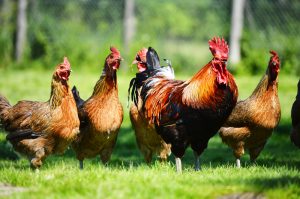You’ve decided that you want to raise backyard chickens. Now, the question of what you need to get comes up. Many people are quick to choose a breed, but often overlook a very important question- “How many hens and roosters do I need?”. You may be surprised to know that you don’t need a rooster at all if you’re just looking to have fresh eggs. Hens will produce eggs even when a rooster isn’t around!
But, if you’re set on having a rooster and you dream of a backyard farm, baby chicks, and being woken up by the crow of a rooster… then you’ll want to make sure that you get the right number of roosters for your flock.
Keep reading to see how many roosters you need.
Roosters are optional.
This is something that you may be excited about if the idea of a rooster crowing before daylight doesn’t sound appealing. Laying hens will lay just as well without a rooster present. In fact, commercial eggs that you’d buy in the grocery are laid by hens that have likely never even seen a rooster.
A rooster is only needed when you want to have fertilized eggs. If you want to hatch eggs, sell fertile eggs or want to allow your hens to hatch chicks, then you’ll want a rooster. The eggs that a hen lays when she isn’t with a rooster will not be fertile and won’t hatch into chicks. Many people that raise chickens can make a profit by selling fertile eggs or baby chicks.
Roosters are also helpful in keeping your hens safe. Roosters are programmed to watch out for dangers. They’ll spend a large amount of time scanning the nearby area and sky for predators. If a predator does show up, not only will they sound the alarm, they’ll fight to protect your hens. Roosters are great to have if your chickens spend a large amount of time out of the coop.

How many roosters do you need?
Before we can answer this question, spend a few minutes and think about what you want roosters for. Do you want a rooster to help keep your hens safe and just have around? Or, do you need a rooster to breed your hens so that you have fertile eggs? What you want to have roosters for will help you decide how many roosters you need.
You may only want one rooster if you’re just wanting a rooster to help look out for your hens or to simply enjoy. If you’re not worried about having fertilized eggs, then one rooster will suffice.
Once you decide you want to breed your hens or you want fertile eggs, then the number of roosters you need will be determined by the number of hens you have. For the most part, one rooster can breed 4-6 hens. There is some variance among breeds and among individuals. Some roosters are more aggressive breeders than others and can keep more hens fertile.
For a flock of 6 hens, one rooster will do. If you have more hens, then you’ll need an additional rooster. You’ll want to consider breeds also. If you’re trying to keep your breeds pure, you’ll want a rooster for each breed of hen that you want to breed. For example, if you have 4 Lavender Orpingtons, 5 Rhode Island Red hens and 6 Wyandotte hens, and you want to breed purebred hens, you’ll need one Lavender Orpington rooster, one Rhode Island Red rooster and one Wyandotte rooster. You’ll also need to keep the breeds separate to prevent cross-breeding.
If you have more than one rooster, you will need to monitor them and make sure that they don’t fight one another. This is especially true if your flocks are cooped up together. Flocks that spend time out of the coop will have enough space to separate and usually will do just that. If you find your roosters fighting, separate them as soon as possible.
It can be tempting to have rooster and hen pairs, but that isn’t ideal for the backyard chicken farmer. Roosters are aggressive breeders and can quickly injure hens by trying to over-breed them. Keeping 4-6 hens per rooster will make sure that both the roosters and the hens are safe, happy and healthy.